Organizational Behavior Report: Unilever, Factors, Motivation, Teams
VerifiedAdded on 2020/07/22
|15
|4610
|95
Report
AI Summary
This report provides an in-depth analysis of organizational behavior, focusing on the factors that influence team and individual behavior within an organization, particularly referencing Unilever. It explores the impact of culture, politics, and power dynamics. The report delves into content and process theories of motivation, including Maslow's hierarchy of needs and the application of both extrinsic and intrinsic motivational techniques. It also examines the formation and characteristics of both effective and ineffective teams, highlighting the importance of departmental structures and leadership styles such as task vs. relationship leadership. Furthermore, the report touches upon concepts from behavioral psychology like emotional intelligence and soft skills necessary for managers. The report concludes by discussing the application of organizational behavior principles and philosophies to enhance workplace effectiveness, emphasizing the significance of these concepts for organizational success.
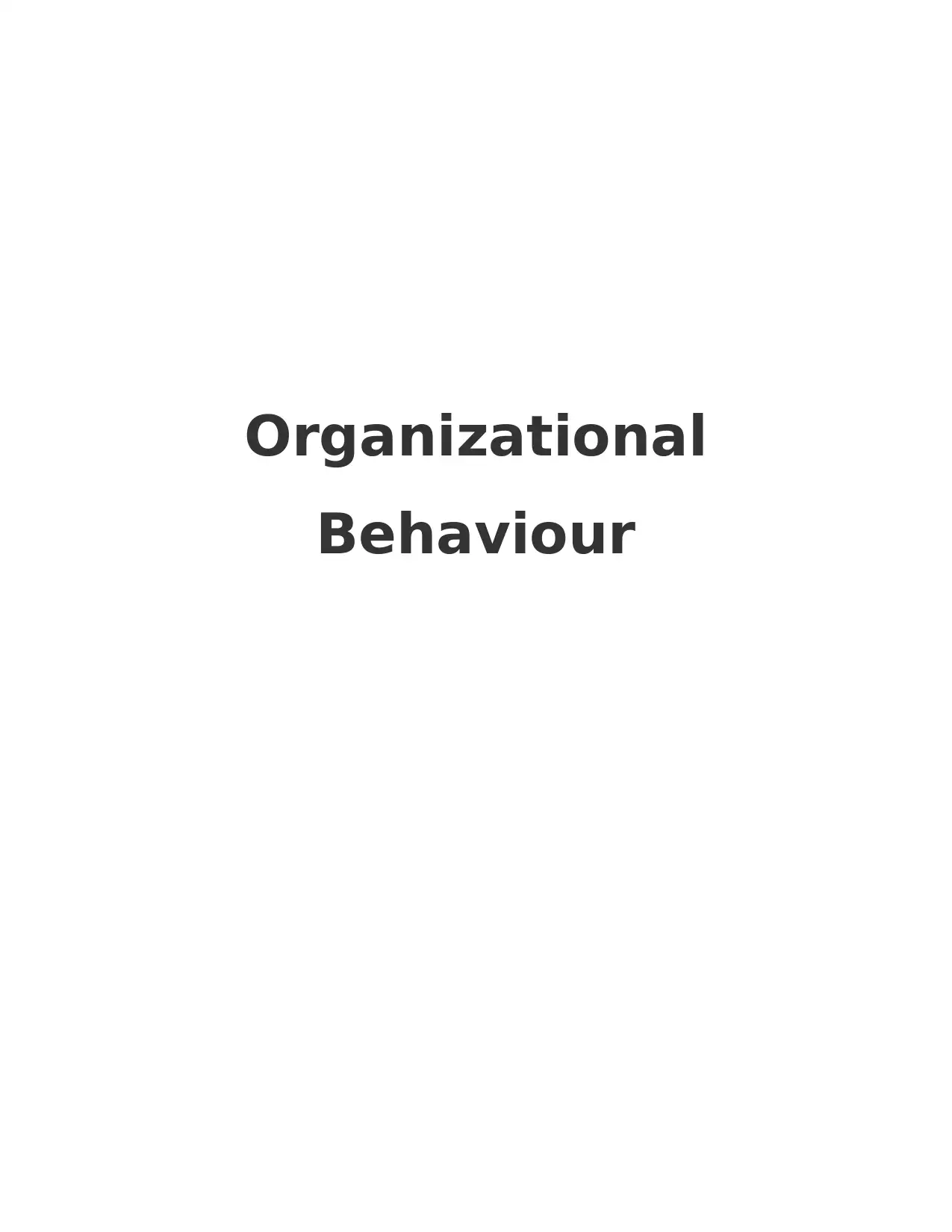
Organizational
Behaviour
Behaviour
Paraphrase This Document
Need a fresh take? Get an instant paraphrase of this document with our AI Paraphraser
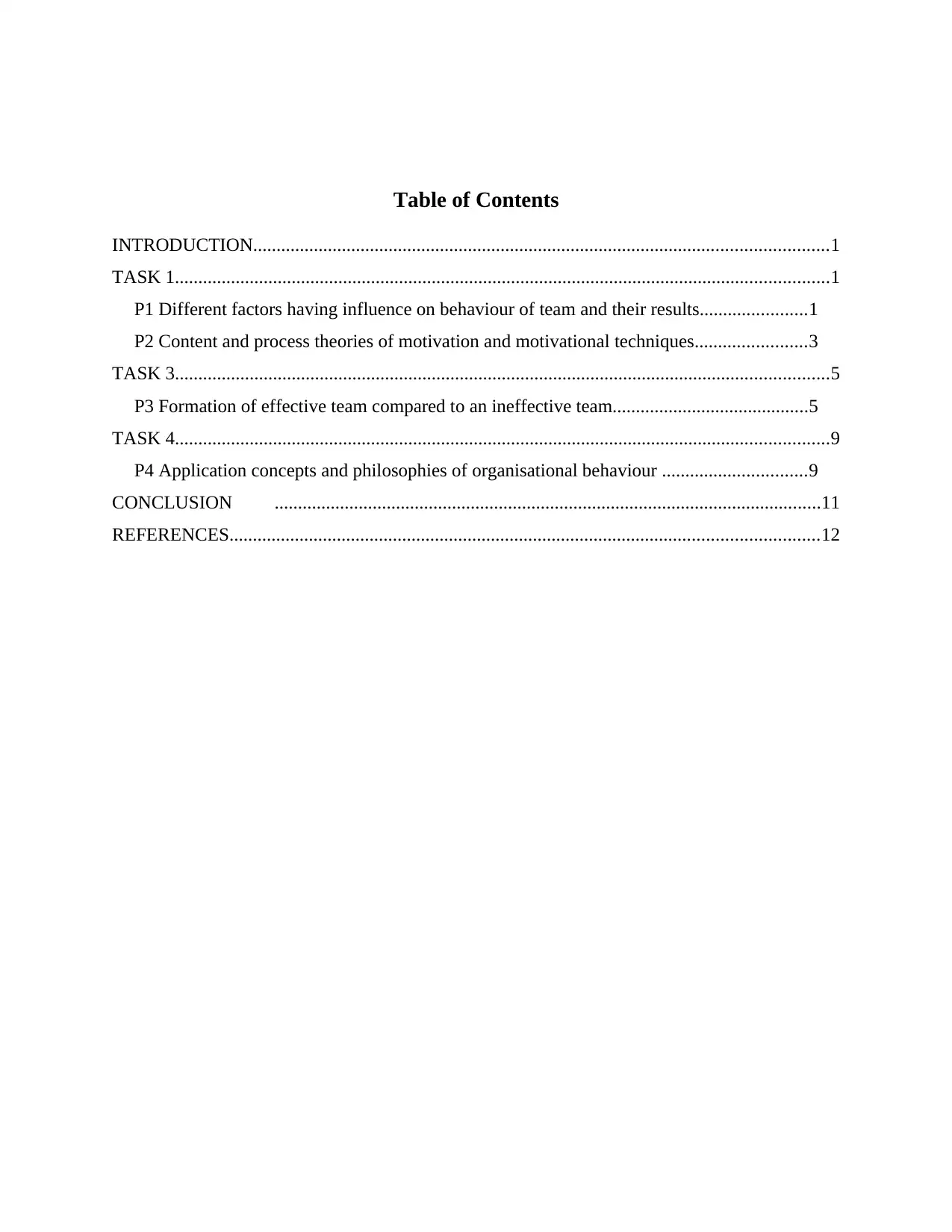
Table of Contents
INTRODUCTION...........................................................................................................................1
TASK 1............................................................................................................................................1
P1 Different factors having influence on behaviour of team and their results.......................1
P2 Content and process theories of motivation and motivational techniques........................3
TASK 3............................................................................................................................................5
P3 Formation of effective team compared to an ineffective team..........................................5
TASK 4............................................................................................................................................9
P4 Application concepts and philosophies of organisational behaviour ...............................9
CONCLUSION .....................................................................................................................11
REFERENCES..............................................................................................................................12
INTRODUCTION...........................................................................................................................1
TASK 1............................................................................................................................................1
P1 Different factors having influence on behaviour of team and their results.......................1
P2 Content and process theories of motivation and motivational techniques........................3
TASK 3............................................................................................................................................5
P3 Formation of effective team compared to an ineffective team..........................................5
TASK 4............................................................................................................................................9
P4 Application concepts and philosophies of organisational behaviour ...............................9
CONCLUSION .....................................................................................................................11
REFERENCES..............................................................................................................................12
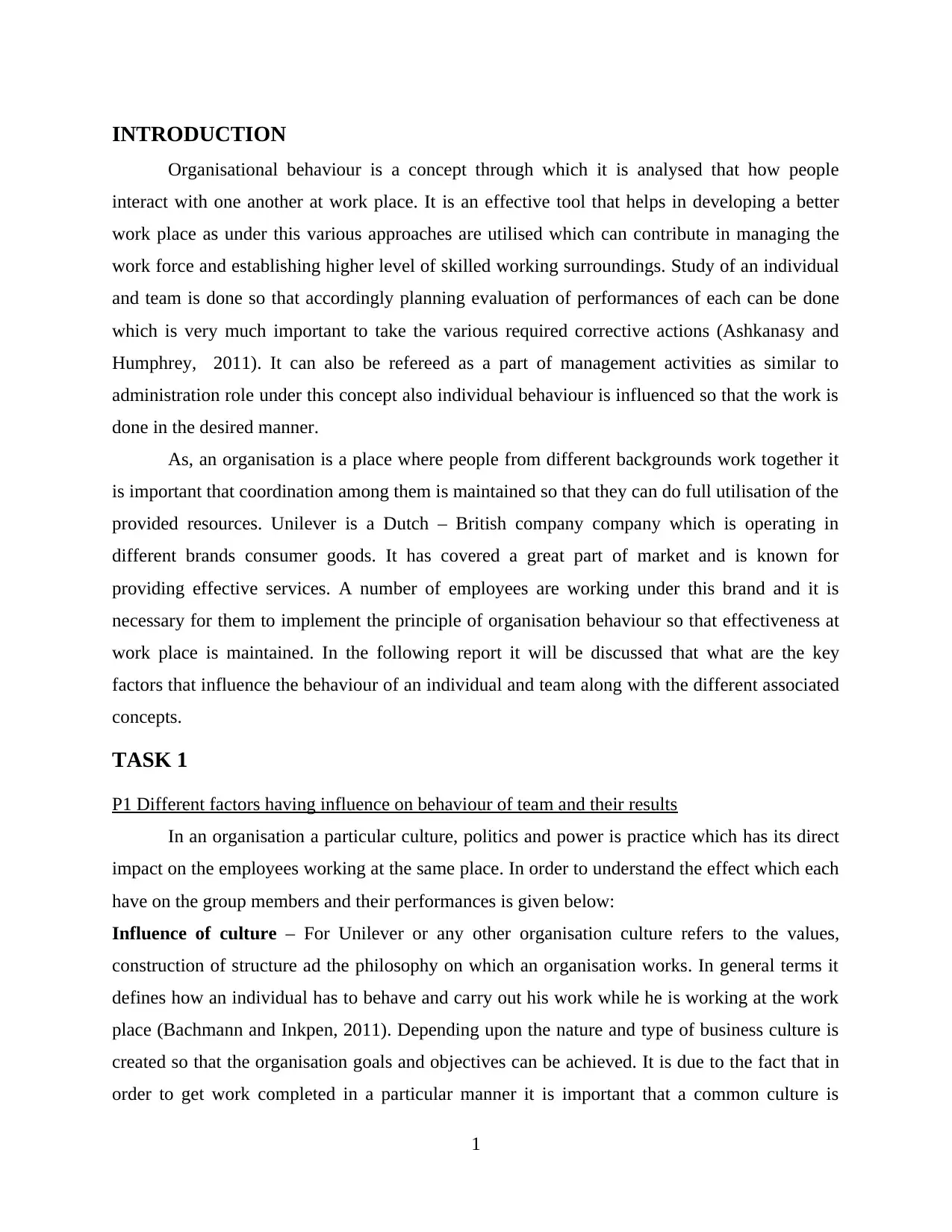
INTRODUCTION
Organisational behaviour is a concept through which it is analysed that how people
interact with one another at work place. It is an effective tool that helps in developing a better
work place as under this various approaches are utilised which can contribute in managing the
work force and establishing higher level of skilled working surroundings. Study of an individual
and team is done so that accordingly planning evaluation of performances of each can be done
which is very much important to take the various required corrective actions (Ashkanasy and
Humphrey, 2011). It can also be refereed as a part of management activities as similar to
administration role under this concept also individual behaviour is influenced so that the work is
done in the desired manner.
As, an organisation is a place where people from different backgrounds work together it
is important that coordination among them is maintained so that they can do full utilisation of the
provided resources. Unilever is a Dutch – British company company which is operating in
different brands consumer goods. It has covered a great part of market and is known for
providing effective services. A number of employees are working under this brand and it is
necessary for them to implement the principle of organisation behaviour so that effectiveness at
work place is maintained. In the following report it will be discussed that what are the key
factors that influence the behaviour of an individual and team along with the different associated
concepts.
TASK 1
P1 Different factors having influence on behaviour of team and their results
In an organisation a particular culture, politics and power is practice which has its direct
impact on the employees working at the same place. In order to understand the effect which each
have on the group members and their performances is given below:
Influence of culture – For Unilever or any other organisation culture refers to the values,
construction of structure ad the philosophy on which an organisation works. In general terms it
defines how an individual has to behave and carry out his work while he is working at the work
place (Bachmann and Inkpen, 2011). Depending upon the nature and type of business culture is
created so that the organisation goals and objectives can be achieved. It is due to the fact that in
order to get work completed in a particular manner it is important that a common culture is
1
Organisational behaviour is a concept through which it is analysed that how people
interact with one another at work place. It is an effective tool that helps in developing a better
work place as under this various approaches are utilised which can contribute in managing the
work force and establishing higher level of skilled working surroundings. Study of an individual
and team is done so that accordingly planning evaluation of performances of each can be done
which is very much important to take the various required corrective actions (Ashkanasy and
Humphrey, 2011). It can also be refereed as a part of management activities as similar to
administration role under this concept also individual behaviour is influenced so that the work is
done in the desired manner.
As, an organisation is a place where people from different backgrounds work together it
is important that coordination among them is maintained so that they can do full utilisation of the
provided resources. Unilever is a Dutch – British company company which is operating in
different brands consumer goods. It has covered a great part of market and is known for
providing effective services. A number of employees are working under this brand and it is
necessary for them to implement the principle of organisation behaviour so that effectiveness at
work place is maintained. In the following report it will be discussed that what are the key
factors that influence the behaviour of an individual and team along with the different associated
concepts.
TASK 1
P1 Different factors having influence on behaviour of team and their results
In an organisation a particular culture, politics and power is practice which has its direct
impact on the employees working at the same place. In order to understand the effect which each
have on the group members and their performances is given below:
Influence of culture – For Unilever or any other organisation culture refers to the values,
construction of structure ad the philosophy on which an organisation works. In general terms it
defines how an individual has to behave and carry out his work while he is working at the work
place (Bachmann and Inkpen, 2011). Depending upon the nature and type of business culture is
created so that the organisation goals and objectives can be achieved. It is due to the fact that in
order to get work completed in a particular manner it is important that a common culture is
1
⊘ This is a preview!⊘
Do you want full access?
Subscribe today to unlock all pages.

Trusted by 1+ million students worldwide
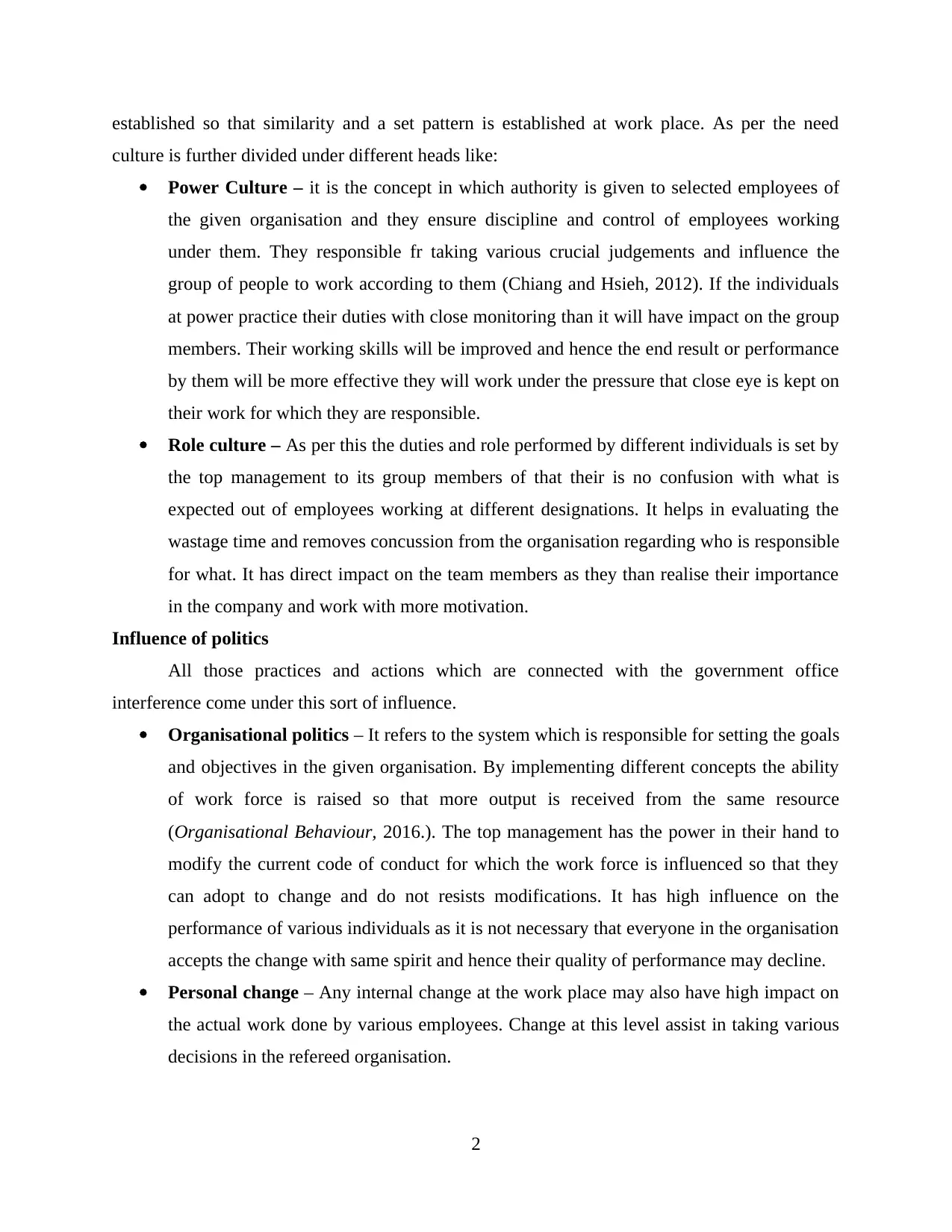
established so that similarity and a set pattern is established at work place. As per the need
culture is further divided under different heads like:
Power Culture – it is the concept in which authority is given to selected employees of
the given organisation and they ensure discipline and control of employees working
under them. They responsible fr taking various crucial judgements and influence the
group of people to work according to them (Chiang and Hsieh, 2012). If the individuals
at power practice their duties with close monitoring than it will have impact on the group
members. Their working skills will be improved and hence the end result or performance
by them will be more effective they will work under the pressure that close eye is kept on
their work for which they are responsible.
Role culture – As per this the duties and role performed by different individuals is set by
the top management to its group members of that their is no confusion with what is
expected out of employees working at different designations. It helps in evaluating the
wastage time and removes concussion from the organisation regarding who is responsible
for what. It has direct impact on the team members as they than realise their importance
in the company and work with more motivation.
Influence of politics
All those practices and actions which are connected with the government office
interference come under this sort of influence.
Organisational politics – It refers to the system which is responsible for setting the goals
and objectives in the given organisation. By implementing different concepts the ability
of work force is raised so that more output is received from the same resource
(Organisational Behaviour, 2016.). The top management has the power in their hand to
modify the current code of conduct for which the work force is influenced so that they
can adopt to change and do not resists modifications. It has high influence on the
performance of various individuals as it is not necessary that everyone in the organisation
accepts the change with same spirit and hence their quality of performance may decline.
Personal change – Any internal change at the work place may also have high impact on
the actual work done by various employees. Change at this level assist in taking various
decisions in the refereed organisation.
2
culture is further divided under different heads like:
Power Culture – it is the concept in which authority is given to selected employees of
the given organisation and they ensure discipline and control of employees working
under them. They responsible fr taking various crucial judgements and influence the
group of people to work according to them (Chiang and Hsieh, 2012). If the individuals
at power practice their duties with close monitoring than it will have impact on the group
members. Their working skills will be improved and hence the end result or performance
by them will be more effective they will work under the pressure that close eye is kept on
their work for which they are responsible.
Role culture – As per this the duties and role performed by different individuals is set by
the top management to its group members of that their is no confusion with what is
expected out of employees working at different designations. It helps in evaluating the
wastage time and removes concussion from the organisation regarding who is responsible
for what. It has direct impact on the team members as they than realise their importance
in the company and work with more motivation.
Influence of politics
All those practices and actions which are connected with the government office
interference come under this sort of influence.
Organisational politics – It refers to the system which is responsible for setting the goals
and objectives in the given organisation. By implementing different concepts the ability
of work force is raised so that more output is received from the same resource
(Organisational Behaviour, 2016.). The top management has the power in their hand to
modify the current code of conduct for which the work force is influenced so that they
can adopt to change and do not resists modifications. It has high influence on the
performance of various individuals as it is not necessary that everyone in the organisation
accepts the change with same spirit and hence their quality of performance may decline.
Personal change – Any internal change at the work place may also have high impact on
the actual work done by various employees. Change at this level assist in taking various
decisions in the refereed organisation.
2
Paraphrase This Document
Need a fresh take? Get an instant paraphrase of this document with our AI Paraphraser
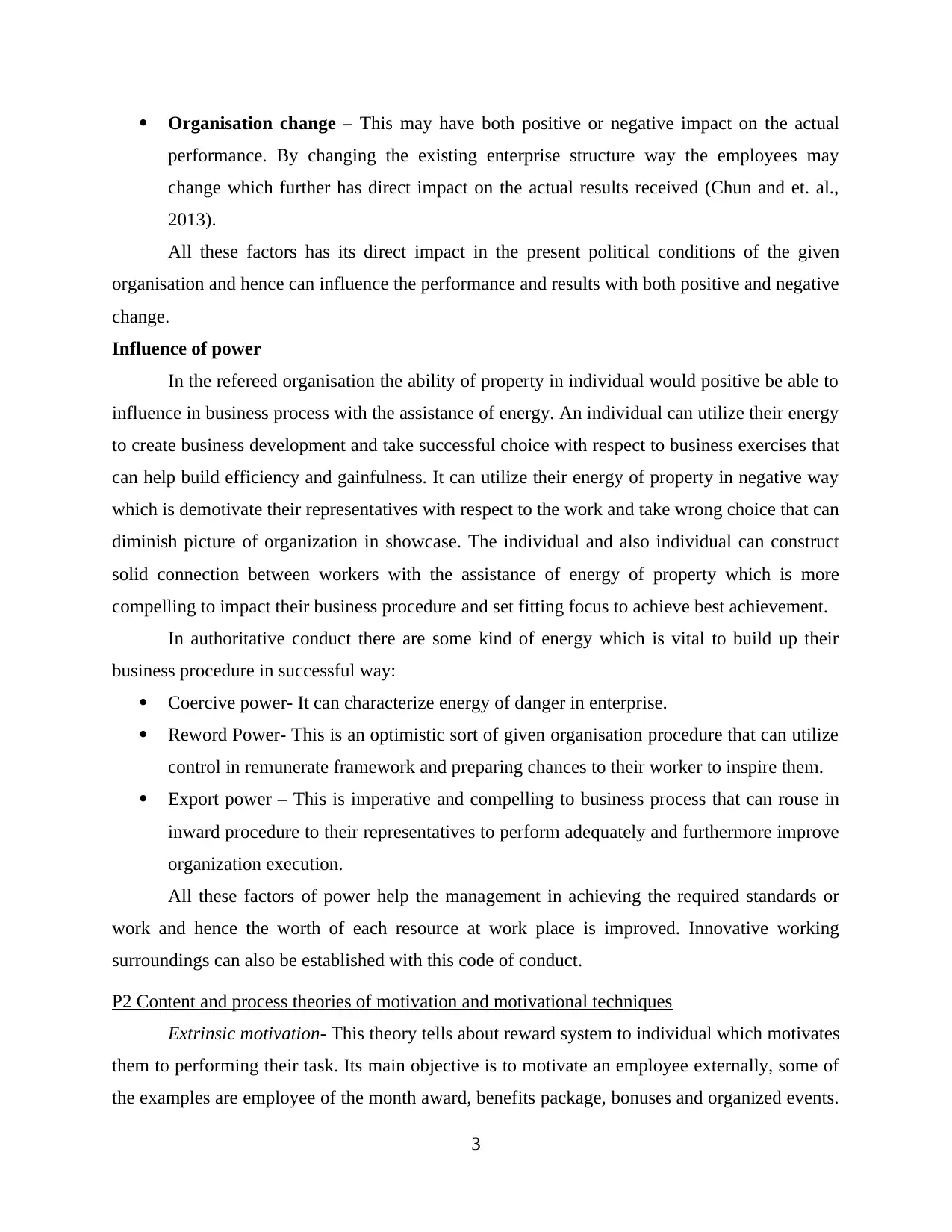
Organisation change – This may have both positive or negative impact on the actual
performance. By changing the existing enterprise structure way the employees may
change which further has direct impact on the actual results received (Chun and et. al.,
2013).
All these factors has its direct impact in the present political conditions of the given
organisation and hence can influence the performance and results with both positive and negative
change.
Influence of power
In the refereed organisation the ability of property in individual would positive be able to
influence in business process with the assistance of energy. An individual can utilize their energy
to create business development and take successful choice with respect to business exercises that
can help build efficiency and gainfulness. It can utilize their energy of property in negative way
which is demotivate their representatives with respect to the work and take wrong choice that can
diminish picture of organization in showcase. The individual and also individual can construct
solid connection between workers with the assistance of energy of property which is more
compelling to impact their business procedure and set fitting focus to achieve best achievement.
In authoritative conduct there are some kind of energy which is vital to build up their
business procedure in successful way:
Coercive power- It can characterize energy of danger in enterprise.
Reword Power- This is an optimistic sort of given organisation procedure that can utilize
control in remunerate framework and preparing chances to their worker to inspire them.
Export power – This is imperative and compelling to business process that can rouse in
inward procedure to their representatives to perform adequately and furthermore improve
organization execution.
All these factors of power help the management in achieving the required standards or
work and hence the worth of each resource at work place is improved. Innovative working
surroundings can also be established with this code of conduct.
P2 Content and process theories of motivation and motivational techniques
Extrinsic motivation- This theory tells about reward system to individual which motivates
them to performing their task. Its main objective is to motivate an employee externally, some of
the examples are employee of the month award, benefits package, bonuses and organized events.
3
performance. By changing the existing enterprise structure way the employees may
change which further has direct impact on the actual results received (Chun and et. al.,
2013).
All these factors has its direct impact in the present political conditions of the given
organisation and hence can influence the performance and results with both positive and negative
change.
Influence of power
In the refereed organisation the ability of property in individual would positive be able to
influence in business process with the assistance of energy. An individual can utilize their energy
to create business development and take successful choice with respect to business exercises that
can help build efficiency and gainfulness. It can utilize their energy of property in negative way
which is demotivate their representatives with respect to the work and take wrong choice that can
diminish picture of organization in showcase. The individual and also individual can construct
solid connection between workers with the assistance of energy of property which is more
compelling to impact their business procedure and set fitting focus to achieve best achievement.
In authoritative conduct there are some kind of energy which is vital to build up their
business procedure in successful way:
Coercive power- It can characterize energy of danger in enterprise.
Reword Power- This is an optimistic sort of given organisation procedure that can utilize
control in remunerate framework and preparing chances to their worker to inspire them.
Export power – This is imperative and compelling to business process that can rouse in
inward procedure to their representatives to perform adequately and furthermore improve
organization execution.
All these factors of power help the management in achieving the required standards or
work and hence the worth of each resource at work place is improved. Innovative working
surroundings can also be established with this code of conduct.
P2 Content and process theories of motivation and motivational techniques
Extrinsic motivation- This theory tells about reward system to individual which motivates
them to performing their task. Its main objective is to motivate an employee externally, some of
the examples are employee of the month award, benefits package, bonuses and organized events.
3
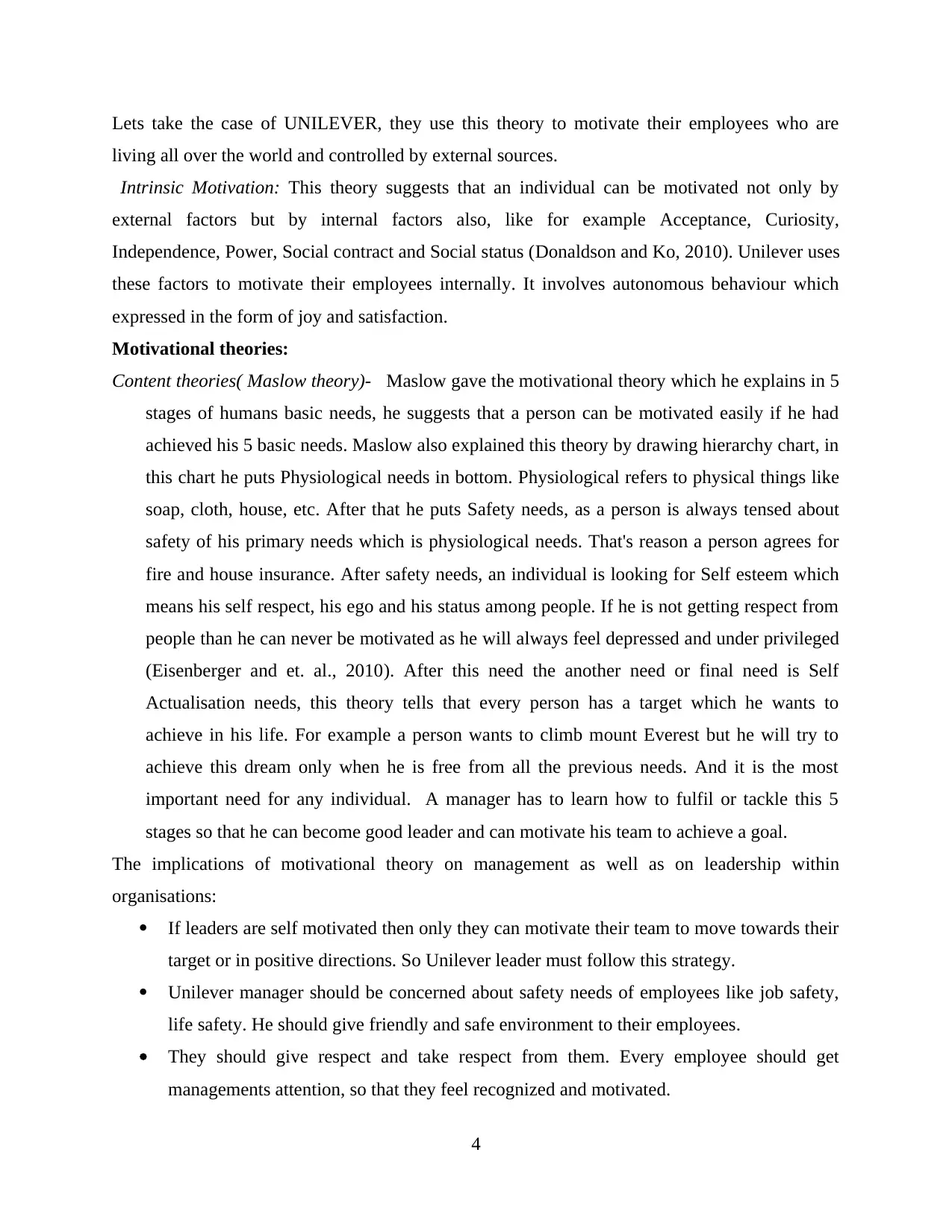
Lets take the case of UNILEVER, they use this theory to motivate their employees who are
living all over the world and controlled by external sources.
Intrinsic Motivation: This theory suggests that an individual can be motivated not only by
external factors but by internal factors also, like for example Acceptance, Curiosity,
Independence, Power, Social contract and Social status (Donaldson and Ko, 2010). Unilever uses
these factors to motivate their employees internally. It involves autonomous behaviour which
expressed in the form of joy and satisfaction.
Motivational theories:
Content theories( Maslow theory)- Maslow gave the motivational theory which he explains in 5
stages of humans basic needs, he suggests that a person can be motivated easily if he had
achieved his 5 basic needs. Maslow also explained this theory by drawing hierarchy chart, in
this chart he puts Physiological needs in bottom. Physiological refers to physical things like
soap, cloth, house, etc. After that he puts Safety needs, as a person is always tensed about
safety of his primary needs which is physiological needs. That's reason a person agrees for
fire and house insurance. After safety needs, an individual is looking for Self esteem which
means his self respect, his ego and his status among people. If he is not getting respect from
people than he can never be motivated as he will always feel depressed and under privileged
(Eisenberger and et. al., 2010). After this need the another need or final need is Self
Actualisation needs, this theory tells that every person has a target which he wants to
achieve in his life. For example a person wants to climb mount Everest but he will try to
achieve this dream only when he is free from all the previous needs. And it is the most
important need for any individual. A manager has to learn how to fulfil or tackle this 5
stages so that he can become good leader and can motivate his team to achieve a goal.
The implications of motivational theory on management as well as on leadership within
organisations:
If leaders are self motivated then only they can motivate their team to move towards their
target or in positive directions. So Unilever leader must follow this strategy.
Unilever manager should be concerned about safety needs of employees like job safety,
life safety. He should give friendly and safe environment to their employees.
They should give respect and take respect from them. Every employee should get
managements attention, so that they feel recognized and motivated.
4
living all over the world and controlled by external sources.
Intrinsic Motivation: This theory suggests that an individual can be motivated not only by
external factors but by internal factors also, like for example Acceptance, Curiosity,
Independence, Power, Social contract and Social status (Donaldson and Ko, 2010). Unilever uses
these factors to motivate their employees internally. It involves autonomous behaviour which
expressed in the form of joy and satisfaction.
Motivational theories:
Content theories( Maslow theory)- Maslow gave the motivational theory which he explains in 5
stages of humans basic needs, he suggests that a person can be motivated easily if he had
achieved his 5 basic needs. Maslow also explained this theory by drawing hierarchy chart, in
this chart he puts Physiological needs in bottom. Physiological refers to physical things like
soap, cloth, house, etc. After that he puts Safety needs, as a person is always tensed about
safety of his primary needs which is physiological needs. That's reason a person agrees for
fire and house insurance. After safety needs, an individual is looking for Self esteem which
means his self respect, his ego and his status among people. If he is not getting respect from
people than he can never be motivated as he will always feel depressed and under privileged
(Eisenberger and et. al., 2010). After this need the another need or final need is Self
Actualisation needs, this theory tells that every person has a target which he wants to
achieve in his life. For example a person wants to climb mount Everest but he will try to
achieve this dream only when he is free from all the previous needs. And it is the most
important need for any individual. A manager has to learn how to fulfil or tackle this 5
stages so that he can become good leader and can motivate his team to achieve a goal.
The implications of motivational theory on management as well as on leadership within
organisations:
If leaders are self motivated then only they can motivate their team to move towards their
target or in positive directions. So Unilever leader must follow this strategy.
Unilever manager should be concerned about safety needs of employees like job safety,
life safety. He should give friendly and safe environment to their employees.
They should give respect and take respect from them. Every employee should get
managements attention, so that they feel recognized and motivated.
4
⊘ This is a preview!⊘
Do you want full access?
Subscribe today to unlock all pages.

Trusted by 1+ million students worldwide
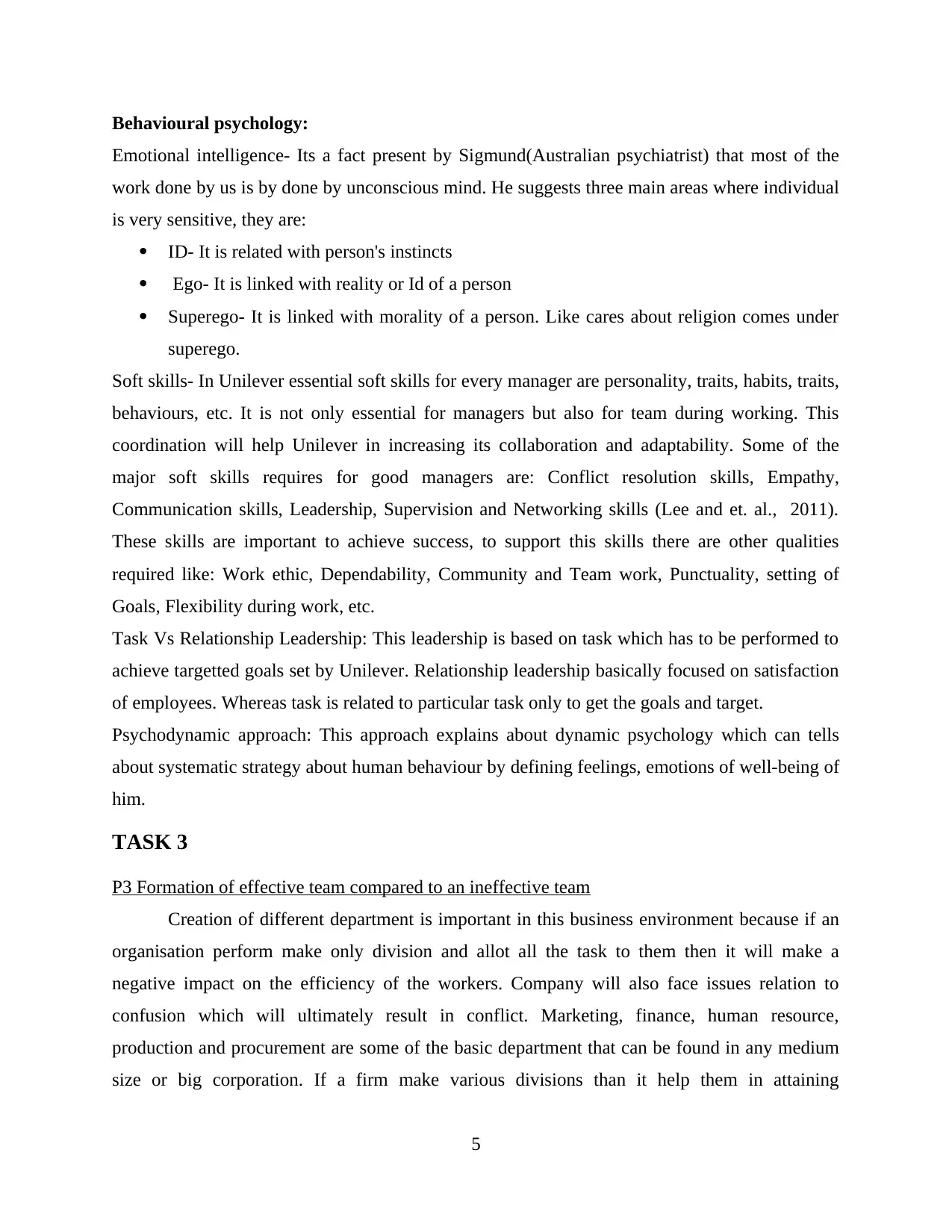
Behavioural psychology:
Emotional intelligence- Its a fact present by Sigmund(Australian psychiatrist) that most of the
work done by us is by done by unconscious mind. He suggests three main areas where individual
is very sensitive, they are:
ID- It is related with person's instincts
Ego- It is linked with reality or Id of a person
Superego- It is linked with morality of a person. Like cares about religion comes under
superego.
Soft skills- In Unilever essential soft skills for every manager are personality, traits, habits, traits,
behaviours, etc. It is not only essential for managers but also for team during working. This
coordination will help Unilever in increasing its collaboration and adaptability. Some of the
major soft skills requires for good managers are: Conflict resolution skills, Empathy,
Communication skills, Leadership, Supervision and Networking skills (Lee and et. al., 2011).
These skills are important to achieve success, to support this skills there are other qualities
required like: Work ethic, Dependability, Community and Team work, Punctuality, setting of
Goals, Flexibility during work, etc.
Task Vs Relationship Leadership: This leadership is based on task which has to be performed to
achieve targetted goals set by Unilever. Relationship leadership basically focused on satisfaction
of employees. Whereas task is related to particular task only to get the goals and target.
Psychodynamic approach: This approach explains about dynamic psychology which can tells
about systematic strategy about human behaviour by defining feelings, emotions of well-being of
him.
TASK 3
P3 Formation of effective team compared to an ineffective team
Creation of different department is important in this business environment because if an
organisation perform make only division and allot all the task to them then it will make a
negative impact on the efficiency of the workers. Company will also face issues relation to
confusion which will ultimately result in conflict. Marketing, finance, human resource,
production and procurement are some of the basic department that can be found in any medium
size or big corporation. If a firm make various divisions than it help them in attaining
5
Emotional intelligence- Its a fact present by Sigmund(Australian psychiatrist) that most of the
work done by us is by done by unconscious mind. He suggests three main areas where individual
is very sensitive, they are:
ID- It is related with person's instincts
Ego- It is linked with reality or Id of a person
Superego- It is linked with morality of a person. Like cares about religion comes under
superego.
Soft skills- In Unilever essential soft skills for every manager are personality, traits, habits, traits,
behaviours, etc. It is not only essential for managers but also for team during working. This
coordination will help Unilever in increasing its collaboration and adaptability. Some of the
major soft skills requires for good managers are: Conflict resolution skills, Empathy,
Communication skills, Leadership, Supervision and Networking skills (Lee and et. al., 2011).
These skills are important to achieve success, to support this skills there are other qualities
required like: Work ethic, Dependability, Community and Team work, Punctuality, setting of
Goals, Flexibility during work, etc.
Task Vs Relationship Leadership: This leadership is based on task which has to be performed to
achieve targetted goals set by Unilever. Relationship leadership basically focused on satisfaction
of employees. Whereas task is related to particular task only to get the goals and target.
Psychodynamic approach: This approach explains about dynamic psychology which can tells
about systematic strategy about human behaviour by defining feelings, emotions of well-being of
him.
TASK 3
P3 Formation of effective team compared to an ineffective team
Creation of different department is important in this business environment because if an
organisation perform make only division and allot all the task to them then it will make a
negative impact on the efficiency of the workers. Company will also face issues relation to
confusion which will ultimately result in conflict. Marketing, finance, human resource,
production and procurement are some of the basic department that can be found in any medium
size or big corporation. If a firm make various divisions than it help them in attaining
5
Paraphrase This Document
Need a fresh take? Get an instant paraphrase of this document with our AI Paraphraser
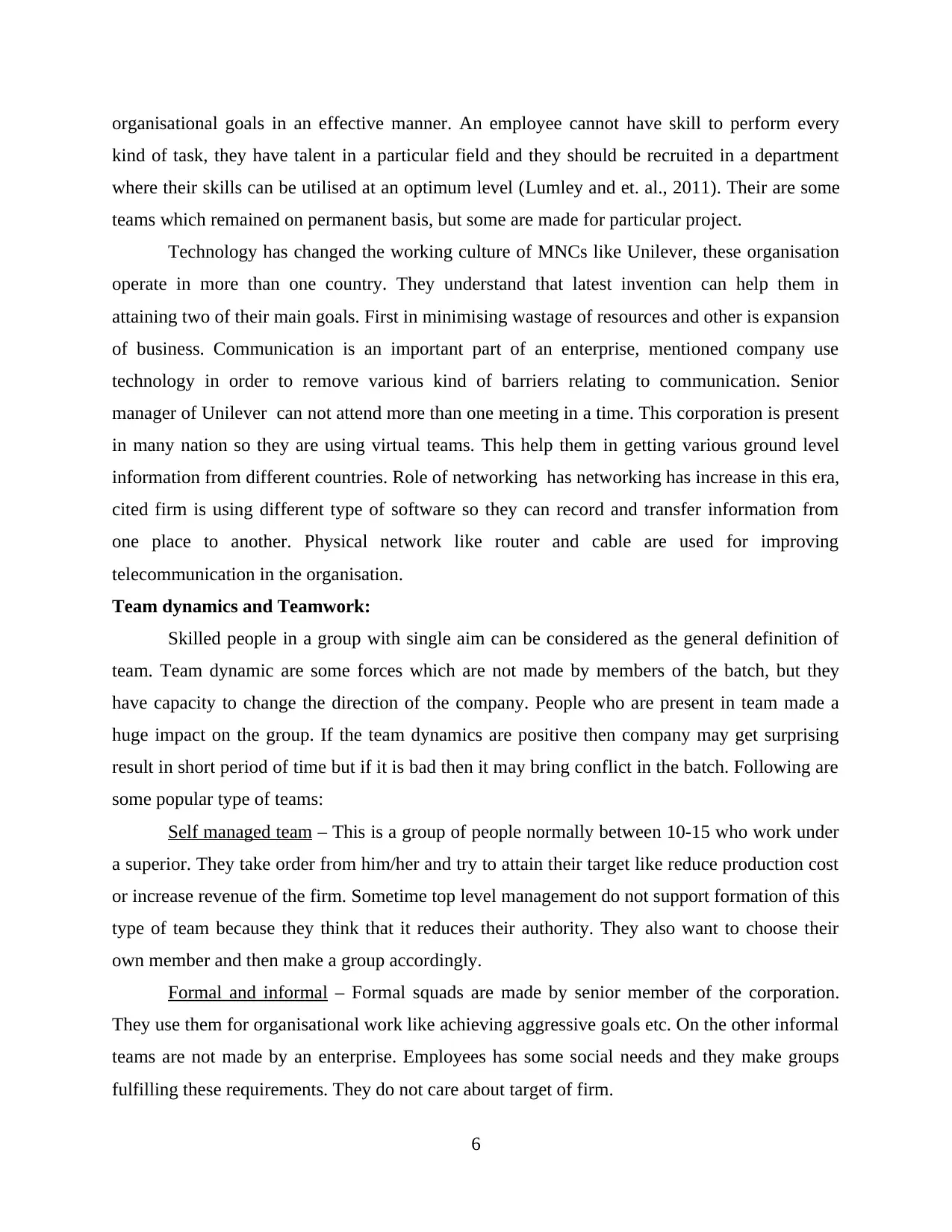
organisational goals in an effective manner. An employee cannot have skill to perform every
kind of task, they have talent in a particular field and they should be recruited in a department
where their skills can be utilised at an optimum level (Lumley and et. al., 2011). Their are some
teams which remained on permanent basis, but some are made for particular project.
Technology has changed the working culture of MNCs like Unilever, these organisation
operate in more than one country. They understand that latest invention can help them in
attaining two of their main goals. First in minimising wastage of resources and other is expansion
of business. Communication is an important part of an enterprise, mentioned company use
technology in order to remove various kind of barriers relating to communication. Senior
manager of Unilever can not attend more than one meeting in a time. This corporation is present
in many nation so they are using virtual teams. This help them in getting various ground level
information from different countries. Role of networking has networking has increase in this era,
cited firm is using different type of software so they can record and transfer information from
one place to another. Physical network like router and cable are used for improving
telecommunication in the organisation.
Team dynamics and Teamwork:
Skilled people in a group with single aim can be considered as the general definition of
team. Team dynamic are some forces which are not made by members of the batch, but they
have capacity to change the direction of the company. People who are present in team made a
huge impact on the group. If the team dynamics are positive then company may get surprising
result in short period of time but if it is bad then it may bring conflict in the batch. Following are
some popular type of teams:
Self managed team – This is a group of people normally between 10-15 who work under
a superior. They take order from him/her and try to attain their target like reduce production cost
or increase revenue of the firm. Sometime top level management do not support formation of this
type of team because they think that it reduces their authority. They also want to choose their
own member and then make a group accordingly.
Formal and informal – Formal squads are made by senior member of the corporation.
They use them for organisational work like achieving aggressive goals etc. On the other informal
teams are not made by an enterprise. Employees has some social needs and they make groups
fulfilling these requirements. They do not care about target of firm.
6
kind of task, they have talent in a particular field and they should be recruited in a department
where their skills can be utilised at an optimum level (Lumley and et. al., 2011). Their are some
teams which remained on permanent basis, but some are made for particular project.
Technology has changed the working culture of MNCs like Unilever, these organisation
operate in more than one country. They understand that latest invention can help them in
attaining two of their main goals. First in minimising wastage of resources and other is expansion
of business. Communication is an important part of an enterprise, mentioned company use
technology in order to remove various kind of barriers relating to communication. Senior
manager of Unilever can not attend more than one meeting in a time. This corporation is present
in many nation so they are using virtual teams. This help them in getting various ground level
information from different countries. Role of networking has networking has increase in this era,
cited firm is using different type of software so they can record and transfer information from
one place to another. Physical network like router and cable are used for improving
telecommunication in the organisation.
Team dynamics and Teamwork:
Skilled people in a group with single aim can be considered as the general definition of
team. Team dynamic are some forces which are not made by members of the batch, but they
have capacity to change the direction of the company. People who are present in team made a
huge impact on the group. If the team dynamics are positive then company may get surprising
result in short period of time but if it is bad then it may bring conflict in the batch. Following are
some popular type of teams:
Self managed team – This is a group of people normally between 10-15 who work under
a superior. They take order from him/her and try to attain their target like reduce production cost
or increase revenue of the firm. Sometime top level management do not support formation of this
type of team because they think that it reduces their authority. They also want to choose their
own member and then make a group accordingly.
Formal and informal – Formal squads are made by senior member of the corporation.
They use them for organisational work like achieving aggressive goals etc. On the other informal
teams are not made by an enterprise. Employees has some social needs and they make groups
fulfilling these requirements. They do not care about target of firm.
6
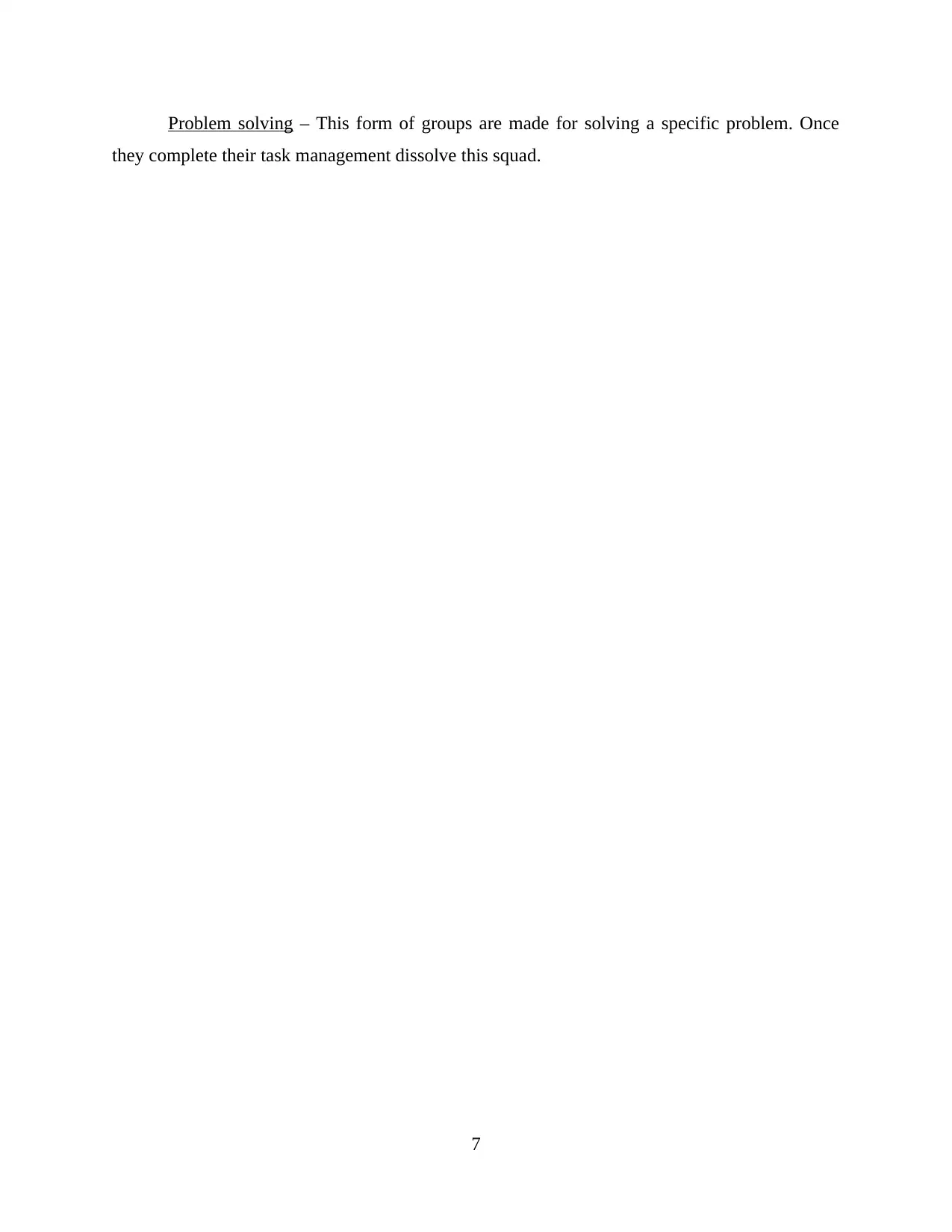
Problem solving – This form of groups are made for solving a specific problem. Once
they complete their task management dissolve this squad.
7
they complete their task management dissolve this squad.
7
⊘ This is a preview!⊘
Do you want full access?
Subscribe today to unlock all pages.

Trusted by 1+ million students worldwide
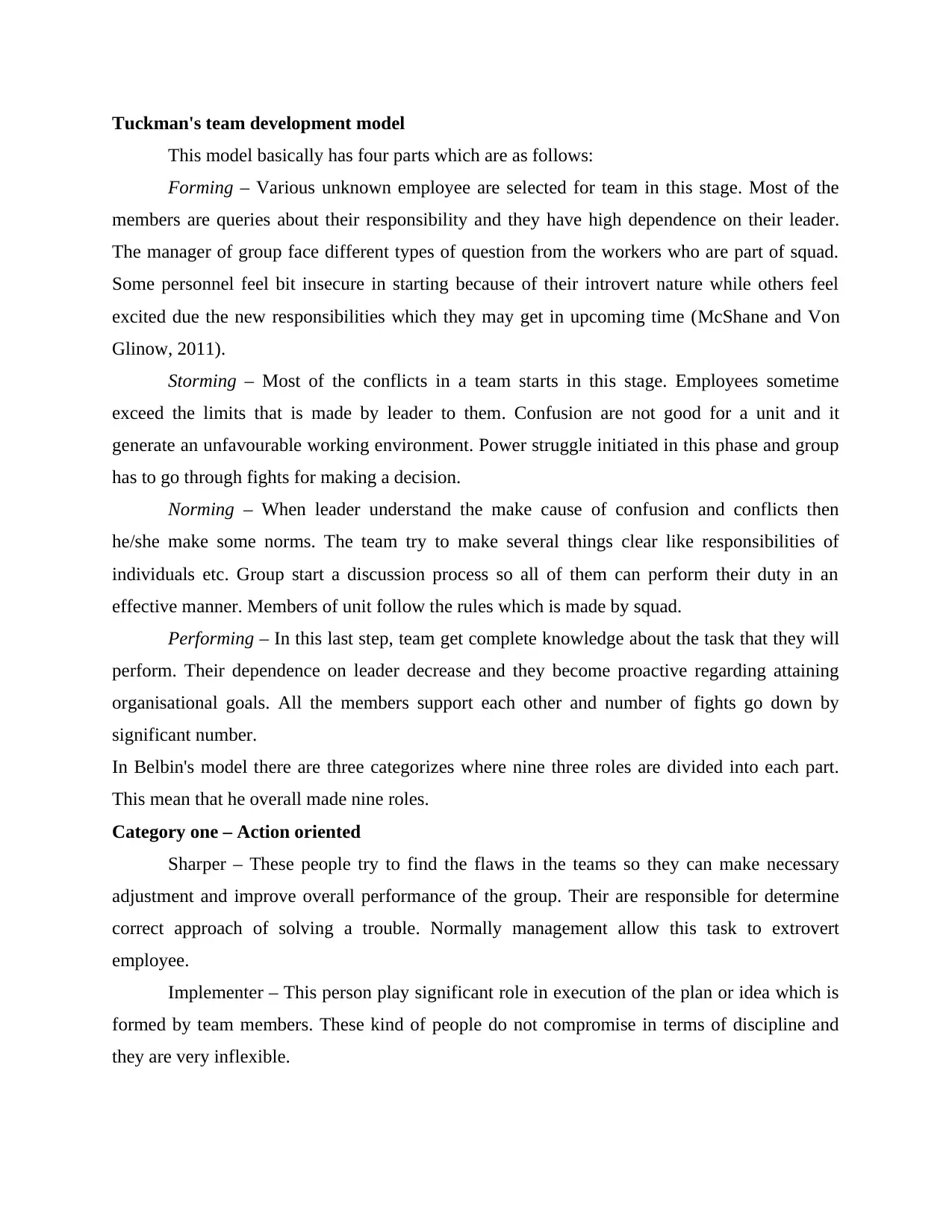
Tuckman's team development model
This model basically has four parts which are as follows:
Forming – Various unknown employee are selected for team in this stage. Most of the
members are queries about their responsibility and they have high dependence on their leader.
The manager of group face different types of question from the workers who are part of squad.
Some personnel feel bit insecure in starting because of their introvert nature while others feel
excited due the new responsibilities which they may get in upcoming time (McShane and Von
Glinow, 2011).
Storming – Most of the conflicts in a team starts in this stage. Employees sometime
exceed the limits that is made by leader to them. Confusion are not good for a unit and it
generate an unfavourable working environment. Power struggle initiated in this phase and group
has to go through fights for making a decision.
Norming – When leader understand the make cause of confusion and conflicts then
he/she make some norms. The team try to make several things clear like responsibilities of
individuals etc. Group start a discussion process so all of them can perform their duty in an
effective manner. Members of unit follow the rules which is made by squad.
Performing – In this last step, team get complete knowledge about the task that they will
perform. Their dependence on leader decrease and they become proactive regarding attaining
organisational goals. All the members support each other and number of fights go down by
significant number.
In Belbin's model there are three categorizes where nine three roles are divided into each part.
This mean that he overall made nine roles.
Category one – Action oriented
Sharper – These people try to find the flaws in the teams so they can make necessary
adjustment and improve overall performance of the group. Their are responsible for determine
correct approach of solving a trouble. Normally management allow this task to extrovert
employee.
Implementer – This person play significant role in execution of the plan or idea which is
formed by team members. These kind of people do not compromise in terms of discipline and
they are very inflexible.
This model basically has four parts which are as follows:
Forming – Various unknown employee are selected for team in this stage. Most of the
members are queries about their responsibility and they have high dependence on their leader.
The manager of group face different types of question from the workers who are part of squad.
Some personnel feel bit insecure in starting because of their introvert nature while others feel
excited due the new responsibilities which they may get in upcoming time (McShane and Von
Glinow, 2011).
Storming – Most of the conflicts in a team starts in this stage. Employees sometime
exceed the limits that is made by leader to them. Confusion are not good for a unit and it
generate an unfavourable working environment. Power struggle initiated in this phase and group
has to go through fights for making a decision.
Norming – When leader understand the make cause of confusion and conflicts then
he/she make some norms. The team try to make several things clear like responsibilities of
individuals etc. Group start a discussion process so all of them can perform their duty in an
effective manner. Members of unit follow the rules which is made by squad.
Performing – In this last step, team get complete knowledge about the task that they will
perform. Their dependence on leader decrease and they become proactive regarding attaining
organisational goals. All the members support each other and number of fights go down by
significant number.
In Belbin's model there are three categorizes where nine three roles are divided into each part.
This mean that he overall made nine roles.
Category one – Action oriented
Sharper – These people try to find the flaws in the teams so they can make necessary
adjustment and improve overall performance of the group. Their are responsible for determine
correct approach of solving a trouble. Normally management allow this task to extrovert
employee.
Implementer – This person play significant role in execution of the plan or idea which is
formed by team members. These kind of people do not compromise in terms of discipline and
they are very inflexible.
Paraphrase This Document
Need a fresh take? Get an instant paraphrase of this document with our AI Paraphraser
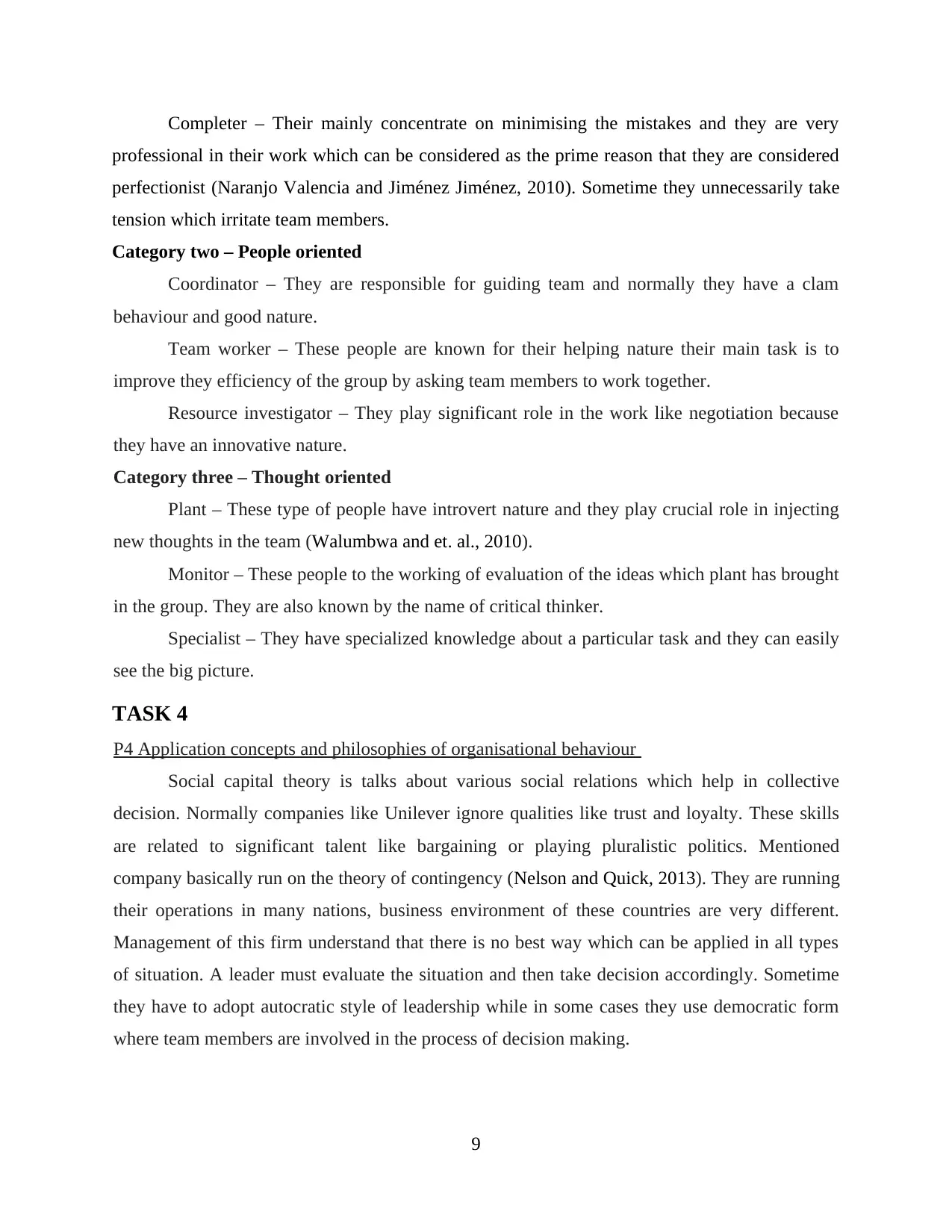
Completer – Their mainly concentrate on minimising the mistakes and they are very
professional in their work which can be considered as the prime reason that they are considered
perfectionist (Naranjo Valencia and Jiménez Jiménez, 2010). Sometime they unnecessarily take
tension which irritate team members.
Category two – People oriented
Coordinator – They are responsible for guiding team and normally they have a clam
behaviour and good nature.
Team worker – These people are known for their helping nature their main task is to
improve they efficiency of the group by asking team members to work together.
Resource investigator – They play significant role in the work like negotiation because
they have an innovative nature.
Category three – Thought oriented
Plant – These type of people have introvert nature and they play crucial role in injecting
new thoughts in the team (Walumbwa and et. al., 2010).
Monitor – These people to the working of evaluation of the ideas which plant has brought
in the group. They are also known by the name of critical thinker.
Specialist – They have specialized knowledge about a particular task and they can easily
see the big picture.
TASK 4
P4 Application concepts and philosophies of organisational behaviour
Social capital theory is talks about various social relations which help in collective
decision. Normally companies like Unilever ignore qualities like trust and loyalty. These skills
are related to significant talent like bargaining or playing pluralistic politics. Mentioned
company basically run on the theory of contingency (Nelson and Quick, 2013). They are running
their operations in many nations, business environment of these countries are very different.
Management of this firm understand that there is no best way which can be applied in all types
of situation. A leader must evaluate the situation and then take decision accordingly. Sometime
they have to adopt autocratic style of leadership while in some cases they use democratic form
where team members are involved in the process of decision making.
9
professional in their work which can be considered as the prime reason that they are considered
perfectionist (Naranjo Valencia and Jiménez Jiménez, 2010). Sometime they unnecessarily take
tension which irritate team members.
Category two – People oriented
Coordinator – They are responsible for guiding team and normally they have a clam
behaviour and good nature.
Team worker – These people are known for their helping nature their main task is to
improve they efficiency of the group by asking team members to work together.
Resource investigator – They play significant role in the work like negotiation because
they have an innovative nature.
Category three – Thought oriented
Plant – These type of people have introvert nature and they play crucial role in injecting
new thoughts in the team (Walumbwa and et. al., 2010).
Monitor – These people to the working of evaluation of the ideas which plant has brought
in the group. They are also known by the name of critical thinker.
Specialist – They have specialized knowledge about a particular task and they can easily
see the big picture.
TASK 4
P4 Application concepts and philosophies of organisational behaviour
Social capital theory is talks about various social relations which help in collective
decision. Normally companies like Unilever ignore qualities like trust and loyalty. These skills
are related to significant talent like bargaining or playing pluralistic politics. Mentioned
company basically run on the theory of contingency (Nelson and Quick, 2013). They are running
their operations in many nations, business environment of these countries are very different.
Management of this firm understand that there is no best way which can be applied in all types
of situation. A leader must evaluate the situation and then take decision accordingly. Sometime
they have to adopt autocratic style of leadership while in some cases they use democratic form
where team members are involved in the process of decision making.
9
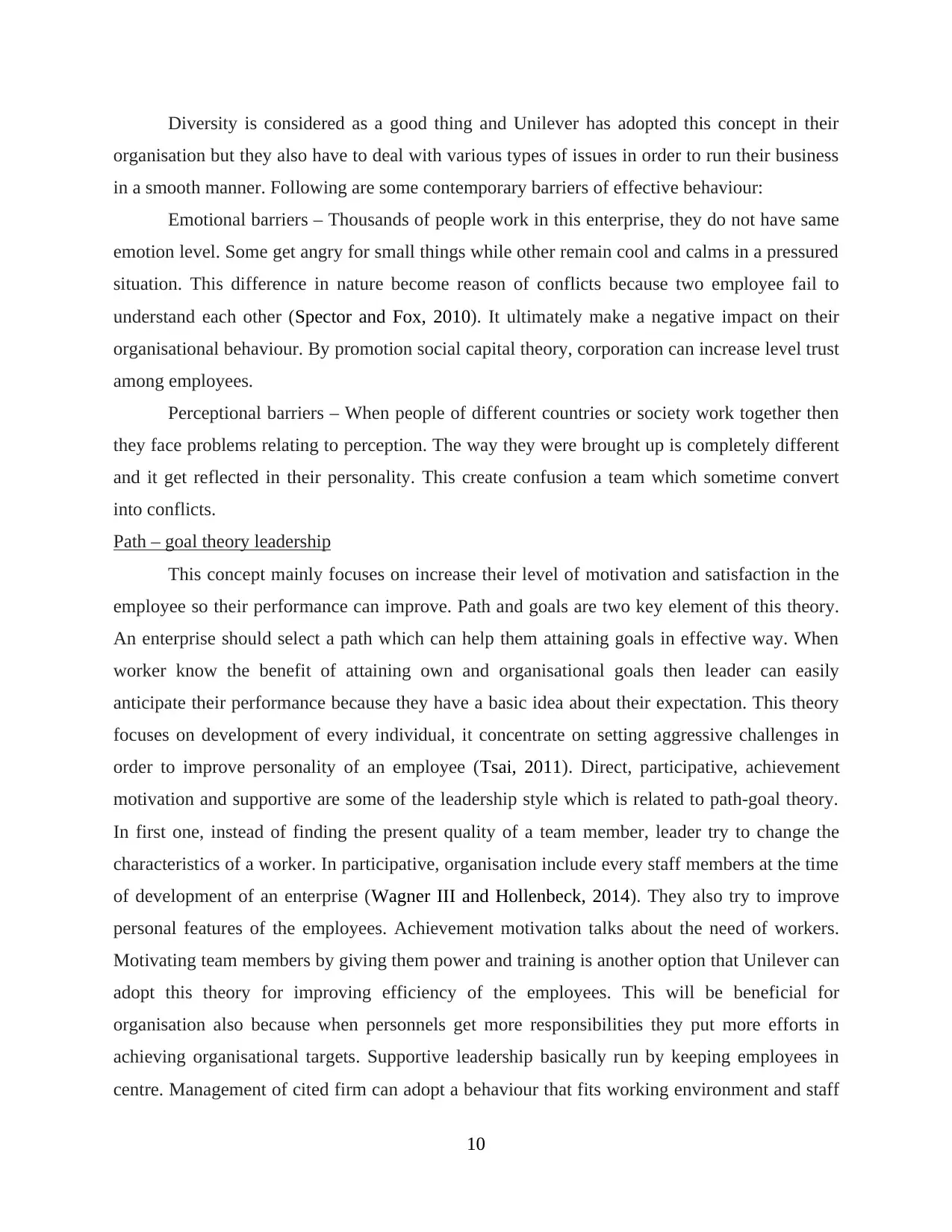
Diversity is considered as a good thing and Unilever has adopted this concept in their
organisation but they also have to deal with various types of issues in order to run their business
in a smooth manner. Following are some contemporary barriers of effective behaviour:
Emotional barriers – Thousands of people work in this enterprise, they do not have same
emotion level. Some get angry for small things while other remain cool and calms in a pressured
situation. This difference in nature become reason of conflicts because two employee fail to
understand each other (Spector and Fox, 2010). It ultimately make a negative impact on their
organisational behaviour. By promotion social capital theory, corporation can increase level trust
among employees.
Perceptional barriers – When people of different countries or society work together then
they face problems relating to perception. The way they were brought up is completely different
and it get reflected in their personality. This create confusion a team which sometime convert
into conflicts.
Path – goal theory leadership
This concept mainly focuses on increase their level of motivation and satisfaction in the
employee so their performance can improve. Path and goals are two key element of this theory.
An enterprise should select a path which can help them attaining goals in effective way. When
worker know the benefit of attaining own and organisational goals then leader can easily
anticipate their performance because they have a basic idea about their expectation. This theory
focuses on development of every individual, it concentrate on setting aggressive challenges in
order to improve personality of an employee (Tsai, 2011). Direct, participative, achievement
motivation and supportive are some of the leadership style which is related to path-goal theory.
In first one, instead of finding the present quality of a team member, leader try to change the
characteristics of a worker. In participative, organisation include every staff members at the time
of development of an enterprise (Wagner III and Hollenbeck, 2014). They also try to improve
personal features of the employees. Achievement motivation talks about the need of workers.
Motivating team members by giving them power and training is another option that Unilever can
adopt this theory for improving efficiency of the employees. This will be beneficial for
organisation also because when personnels get more responsibilities they put more efforts in
achieving organisational targets. Supportive leadership basically run by keeping employees in
centre. Management of cited firm can adopt a behaviour that fits working environment and staff
10
organisation but they also have to deal with various types of issues in order to run their business
in a smooth manner. Following are some contemporary barriers of effective behaviour:
Emotional barriers – Thousands of people work in this enterprise, they do not have same
emotion level. Some get angry for small things while other remain cool and calms in a pressured
situation. This difference in nature become reason of conflicts because two employee fail to
understand each other (Spector and Fox, 2010). It ultimately make a negative impact on their
organisational behaviour. By promotion social capital theory, corporation can increase level trust
among employees.
Perceptional barriers – When people of different countries or society work together then
they face problems relating to perception. The way they were brought up is completely different
and it get reflected in their personality. This create confusion a team which sometime convert
into conflicts.
Path – goal theory leadership
This concept mainly focuses on increase their level of motivation and satisfaction in the
employee so their performance can improve. Path and goals are two key element of this theory.
An enterprise should select a path which can help them attaining goals in effective way. When
worker know the benefit of attaining own and organisational goals then leader can easily
anticipate their performance because they have a basic idea about their expectation. This theory
focuses on development of every individual, it concentrate on setting aggressive challenges in
order to improve personality of an employee (Tsai, 2011). Direct, participative, achievement
motivation and supportive are some of the leadership style which is related to path-goal theory.
In first one, instead of finding the present quality of a team member, leader try to change the
characteristics of a worker. In participative, organisation include every staff members at the time
of development of an enterprise (Wagner III and Hollenbeck, 2014). They also try to improve
personal features of the employees. Achievement motivation talks about the need of workers.
Motivating team members by giving them power and training is another option that Unilever can
adopt this theory for improving efficiency of the employees. This will be beneficial for
organisation also because when personnels get more responsibilities they put more efforts in
achieving organisational targets. Supportive leadership basically run by keeping employees in
centre. Management of cited firm can adopt a behaviour that fits working environment and staff
10
⊘ This is a preview!⊘
Do you want full access?
Subscribe today to unlock all pages.

Trusted by 1+ million students worldwide
1 out of 15
Related Documents
Your All-in-One AI-Powered Toolkit for Academic Success.
+13062052269
info@desklib.com
Available 24*7 on WhatsApp / Email
![[object Object]](/_next/static/media/star-bottom.7253800d.svg)
Unlock your academic potential
Copyright © 2020–2025 A2Z Services. All Rights Reserved. Developed and managed by ZUCOL.





